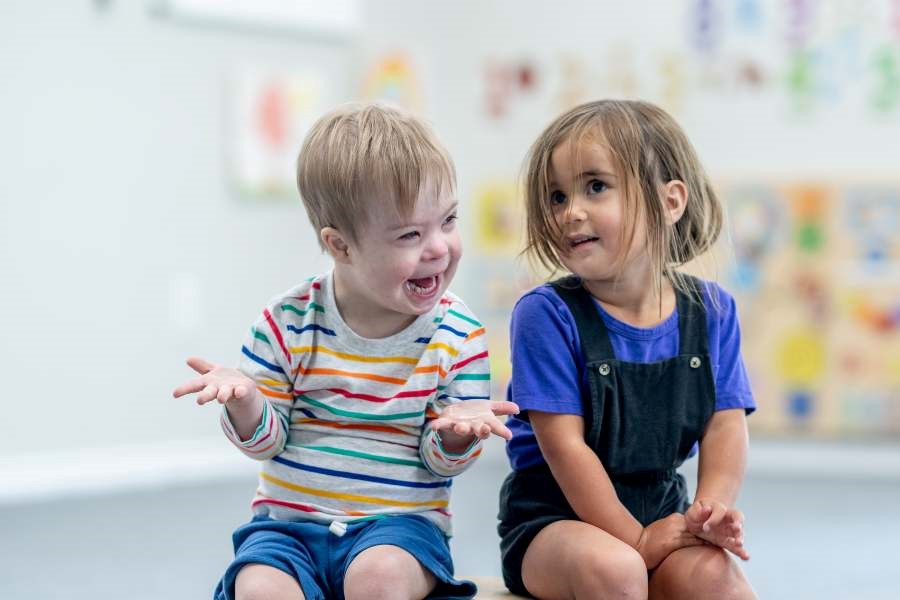Supporting Children with Special Needs in a Childcare Setting

Supporting Children with Special Needs in a Childcare Setting-Feasterville-Trevose, PA; Bensalem, PA; Philadelphia, PA; Medford, NJ, and Mount Laurel Township, NJ
In the world of childcare, there are many children with many types of needs. Childcare workers will also experience children with all kinds of special needs. To understand the needs of each child, teachers and helpers need to see the heart of the child. They need to have ways of making each child feel comfortable and loved. Special needs are still needs, and the most crucial way to help is to know that the ultimate goal is to meet the needs of every child. What does the law say about special needs? This is something else to consider when educating a special needs child. Here, we will explore the best ways to support children with special needs in the childcare setting.
Inclusive Childcare Programs
What does it mean to have special needs inclusion in the classroom? It simply means that children with special needs are allowed to experience the classroom just like any other child would. The school accommodates the child’s needs, and it is an inclusive classroom. Special needs children work alongside their neurotypical peers.
Adapting to Support Children with Disabilities
There are many ways that a classroom can adapt to support special needs children. Some modifications that can be made to a special needs classroom are as follows:
- Create a Plan
Working with special needs children means creating an IEP or individualized education plan. This term refers to developing a specific strategy based on each child’s needs so that you can provide exactly what they can use to acquire the best possible education they can have. - Toy and Equipment Modifications
Making a few adjustments in the classroom can look like modifying toys slightly. For example, simplifying puzzles or supplementing with smaller toys for smaller hands can be just the change you need to create a friendlier environment for special needs students. - Setting an Example for Appropriate Behavior in the Classroom
Teachers can model playing with others for children with special needs. In an inclusive classroom, they can also model playing with special needs children for the typically developing children so all can play happily together. - Making Environmental Changes
Once the appropriate IEPs are in place, a teacher may choose to modify and adjust the classroom to cater to the abilities of special needs children. For example, creating a peaceful environment for a student who is easily overstimulated or creating a brighter environment for a student who can’t see clearly are some ways that the classroom may be modified to help. - Collaborate within the School
The school director, the arts teachers, and any other teachers who interact with special needs children should be kept apprised of the modifications made and should adjust accordingly. - Teaching Specific Ways for Children to Behave and Play with Special Needs Children
Typically developing children will need to be taught about how to interact, talk, and play with special needs children. - Modification of Meals for Dietary Restrictions
Adjustments should be made for any students who have dietary restrictions. Nut allergies are crucial to note, but other food sensitivities should also be noted and accounted for.
Childcare for Children with Special Needs
Some services that should be considered for teaching children with special needs are:
- Early Intervention
Specifically tailored therapies, such as speech, physical therapy, or occupational therapy, can help young children with their unique needs. - Family Involvement
Schools will need to provide resources to families of special needs children. They will want to be kept up to date on their child’s progress and achievements and any challenges they face along the way. - Specialized Teaching Techniques
Students with special needs should be offered visual aids, schedules, and special instructions. Sensory experiences will also be necessary to help promote learning. - Social-Emotional Learning
A large part of early education is social-emotional learning. Instructors in a classroom with special needs children will want to spend extra time with them to help them appropriately express their feelings.
Supporting Neurodiverse Children in Childcare
Ultimately, we want a world in which neurodiverse children are supported in the classroom. The spectrum between “neurotypical” and “neurodivergent” is vast, and many children fall somewhere on that spectrum. This is why the inclusive classroom is so important. Each child has a voice, each child is included, and each child is made to feel special. Most of all, each child will learn to use the gifts they have.
Conclusion
Nurturing and educating are just the beginning of how we care for children with special needs. Providing an inclusive environment where all children are accepted and loved means creating a classroom where all students work together. It also means creating an adaptable classroom setting so that special needs children have every opportunity to advance in the same ways that their typically developing peers are advancing.
Just Children
At Just Children, we provide an inclusive learning environment to help our special needs children feel included, cared for, and loved. We will help foster a love of learning while nurturing your child and their potential. We believe that early childhood education plays an integral role in a child’s development. We design our program knowing that it will affect the child’s educational progress into adulthood. With five locations in Pennsylvania and three in New Jersey, we have a location that will be convenient for you and your family. For more information, visit our website or contact us
